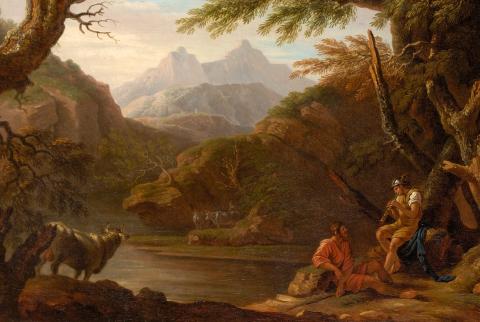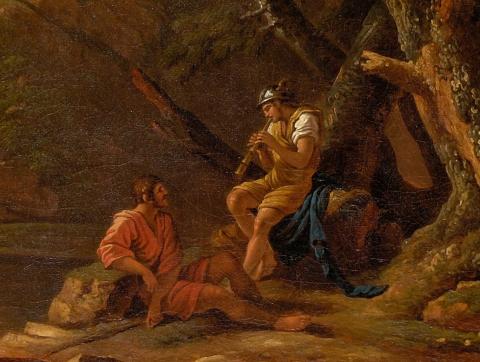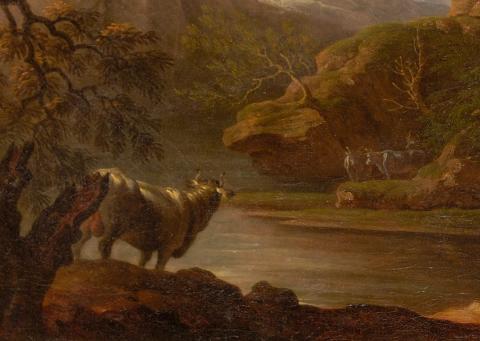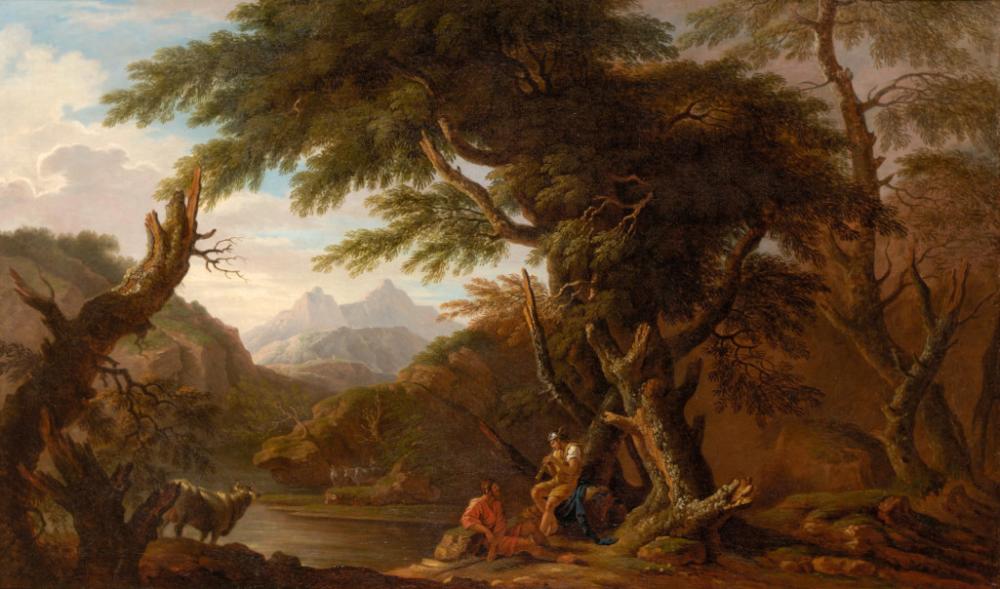If you don’t know the story–as I didn’t–when you first look at
Landscape with Mercury and Argus, the painting is delightfully deceptive.
Nestled in a lush golden landscape, a figure sits on the ground. He leans back against a smooth stone while a second figure, seated higher on a rock opposite him, plays the flute. In the lower left corner, a white cow has turned to face the pair as if she, too, is drawn by the music. Upriver, a few more cows can be seen standing placidly on the bank. This scene has all the adornments of a bucolic paradise, and you wouldn’t be foolish for assuming it was. However, there is a twist hidden in the title: Landscape–
with Mercury and Argus. After admiring this painting for over a year, I finally looked up the story.

In ancient Greek mythology, Zeus was the king of the gods, and a real playboy. These affairs never ended well for the woman; Zeus usually used force or deception to get what he wanted, and on top of that his wife, Hera, was jealous and vengeful. In one such instance, Zeus fell madly in love with a woman named Io (pronounced eye-o). Io was a priestess of Hera, so this liaison was particularly treacherous. There are different versions of the story here: some say Zeus turned Io into a cow in order to hide her from Hera, others say Hera transformed Io herself to punish her. Either way, Io lost her human form and became a white heifer. Hera then took Io to Argus Panoptes, a giant covered with one hundred eyes, and commanded him to guard her lest Zeus try to get her back. And he did try. It wasn’t an easy thing to get past Argus–the giant slept with fifty eyes shut and fifty eye’s open–so Zeus sent his son Hermes
1, the god of thieves, down to deceive Io’s keeper. Hermes came to Argus disguised as a shepherd, and played him sweet lullabies on his flute until Argus fell into a deep sleep, closing all of his eyes. Hermes then decapitated Argus and set Io free.
 Now look at the painting again. The sanctity of glistening foliage and running water becomes impossibly fragile, now that we know it is about to be shattered. The viewer feels compelled to cry out to Argus, to warn him, but he will never hear us. He gazes sweetly upon his musician, perhaps he already feels his eyelids grow heavy2. And Io of course is there too, the cow in the bottom left. What must she be thinking in the final moments before she is freed from her guard–or has he been her guardian? How much did she deduce when Hermes first arrived in the clearing? I would guess quite a lot.
Now look at the painting again. The sanctity of glistening foliage and running water becomes impossibly fragile, now that we know it is about to be shattered. The viewer feels compelled to cry out to Argus, to warn him, but he will never hear us. He gazes sweetly upon his musician, perhaps he already feels his eyelids grow heavy2. And Io of course is there too, the cow in the bottom left. What must she be thinking in the final moments before she is freed from her guard–or has he been her guardian? How much did she deduce when Hermes first arrived in the clearing? I would guess quite a lot.
I was stunned by how different the painting looked to me after reading the myth. I’m a writer as well as a student of art history, so I began journaling my thoughts while I was still sitting in front of Landscape with Argus and Mercury. Over the next several weeks, I kept coming back to the painting, trying to parse its layers. The conclusion I finally drew from the painting came in the form of a poem.

Poetry about art is an old tradition. It’s a genre called
ekphrasis which comes from a Greek word,
ἔκφρασις, meaning to describe or point out. Most ekphrastic poems (such as Keats’
Ode on a Grecian Urn or Auden’s
Musée des Beaux Arts) take a common course: there is a moment of revelation when the poet, standing on the artist’s shoulders, offers the reader a sweeping proclamation.
Tragedy is subjective!3 the only truth is beauty!
4 our gods will be forgotten!5 old age comes for us all!6 Often these revelations are already embedded somewhere in the artwork, but it is the poet’s examination that so acutely draws them out.
I love the idea that one art form can be a mechanism for understanding another, but what I find even more exciting about ekphrastic poetry is that it turns the experience of observing art into a form of art itself. When you next go into a museum or look at the postcards on your fridge, you can have the same exhilarating experience, noticing details and thinking about how a work of art relates to your own life.
Ekphrasis seems to promise a sort of revelation. From what I experienced writing this poem, I believe that the moment of illumination comes whenever we recognize our own life in the lives of others, when, as we wander the labyrinth, we find signs carved into the stone by travelers gone before us, marking time or revealing the way out.
Interview with Zeus, Mt. Olympus Parking Lot
Can it be calculated—
how much brutality for how much love,
He shifts his weight,
in this economy?
Smile at the edges of his mouth. Scent of sky.
No, seriously, (they sit like lovers!)
how much love for a lullaby,
have they gotten so cheap?
He shrugs; it's obvious.
When you five-finger discount a body,
you have that kind of money to spend.
They say a watched murder never boils. It's true.
There’s the river at its riverwork,
her company of cows. Grasses weep
unheard in an unfelt wind.
From what I’ve been told, the errand boy
has a sense of humor
but the joke writes itself—
all those eyes but you didn’t see that coming!
No one moves. There’s that sweet little tune,
look again, look closely,
they call it
Landscape with—
the rest is shadow
to that inevitable light—
Autumn, by the look of it.
He eyes me like he’s wondering when
I’ll get to the real questions:
How does it feel to be prom king?
What’s next after high school?
The things gods like to be asked.
Darwin Michener-Rutledge is an Art History and English double major at Mount Holyoke College, class of 2024. She works as Student Museum Educator and Engagement Intern at the Mount Holyoke College Art Museum, moonlighting as a translator and poet. Her writing has appeared in Poetry Quarterly, Sheepshead Review, and The Mount Holyoke Review. Her translations are featured in Tales of Dionysus, in print with the University of Michigan Press. She is the co-founder of Muzine and Poetry Editor-elect for The Mount Holyoke Review.
1The title refers to him as Mercury, his Roman form.
2 Argus has only two eyes in this depiction. This is a typical alteration in paintings of this myth.
3 W.H. Auden, Musée des Beaux Arts
4 John Keats, Ode on a Grecian Urn
5 Rainer Maria Rilke, Archaic Bust of Apollo
6 Elizabeth Jennings, Rembrandt’s Late Self-Portraits

 In ancient Greek mythology, Zeus was the king of the gods, and a real playboy. These affairs never ended well for the woman; Zeus usually used force or deception to get what he wanted, and on top of that his wife, Hera, was jealous and vengeful. In one such instance, Zeus fell madly in love with a woman named Io (pronounced eye-o). Io was a priestess of Hera, so this liaison was particularly treacherous. There are different versions of the story here: some say Zeus turned Io into a cow in order to hide her from Hera, others say Hera transformed Io herself to punish her. Either way, Io lost her human form and became a white heifer. Hera then took Io to Argus Panoptes, a giant covered with one hundred eyes, and commanded him to guard her lest Zeus try to get her back. And he did try. It wasn’t an easy thing to get past Argus–the giant slept with fifty eyes shut and fifty eye’s open–so Zeus sent his son Hermes1, the god of thieves, down to deceive Io’s keeper. Hermes came to Argus disguised as a shepherd, and played him sweet lullabies on his flute until Argus fell into a deep sleep, closing all of his eyes. Hermes then decapitated Argus and set Io free.
In ancient Greek mythology, Zeus was the king of the gods, and a real playboy. These affairs never ended well for the woman; Zeus usually used force or deception to get what he wanted, and on top of that his wife, Hera, was jealous and vengeful. In one such instance, Zeus fell madly in love with a woman named Io (pronounced eye-o). Io was a priestess of Hera, so this liaison was particularly treacherous. There are different versions of the story here: some say Zeus turned Io into a cow in order to hide her from Hera, others say Hera transformed Io herself to punish her. Either way, Io lost her human form and became a white heifer. Hera then took Io to Argus Panoptes, a giant covered with one hundred eyes, and commanded him to guard her lest Zeus try to get her back. And he did try. It wasn’t an easy thing to get past Argus–the giant slept with fifty eyes shut and fifty eye’s open–so Zeus sent his son Hermes1, the god of thieves, down to deceive Io’s keeper. Hermes came to Argus disguised as a shepherd, and played him sweet lullabies on his flute until Argus fell into a deep sleep, closing all of his eyes. Hermes then decapitated Argus and set Io free. Now look at the painting again. The sanctity of glistening foliage and running water becomes impossibly fragile, now that we know it is about to be shattered. The viewer feels compelled to cry out to Argus, to warn him, but he will never hear us. He gazes sweetly upon his musician, perhaps he already feels his eyelids grow heavy2. And Io of course is there too, the cow in the bottom left. What must she be thinking in the final moments before she is freed from her guard–or has he been her guardian? How much did she deduce when Hermes first arrived in the clearing? I would guess quite a lot.
Now look at the painting again. The sanctity of glistening foliage and running water becomes impossibly fragile, now that we know it is about to be shattered. The viewer feels compelled to cry out to Argus, to warn him, but he will never hear us. He gazes sweetly upon his musician, perhaps he already feels his eyelids grow heavy2. And Io of course is there too, the cow in the bottom left. What must she be thinking in the final moments before she is freed from her guard–or has he been her guardian? How much did she deduce when Hermes first arrived in the clearing? I would guess quite a lot. Poetry about art is an old tradition. It’s a genre called ekphrasis which comes from a Greek word, ἔκφρασις, meaning to describe or point out. Most ekphrastic poems (such as Keats’ Ode on a Grecian Urn or Auden’s Musée des Beaux Arts) take a common course: there is a moment of revelation when the poet, standing on the artist’s shoulders, offers the reader a sweeping proclamation. Tragedy is subjective!3 the only truth is beauty!4 our gods will be forgotten!5 old age comes for us all!6 Often these revelations are already embedded somewhere in the artwork, but it is the poet’s examination that so acutely draws them out.
Poetry about art is an old tradition. It’s a genre called ekphrasis which comes from a Greek word, ἔκφρασις, meaning to describe or point out. Most ekphrastic poems (such as Keats’ Ode on a Grecian Urn or Auden’s Musée des Beaux Arts) take a common course: there is a moment of revelation when the poet, standing on the artist’s shoulders, offers the reader a sweeping proclamation. Tragedy is subjective!3 the only truth is beauty!4 our gods will be forgotten!5 old age comes for us all!6 Often these revelations are already embedded somewhere in the artwork, but it is the poet’s examination that so acutely draws them out.
 Give
Give
